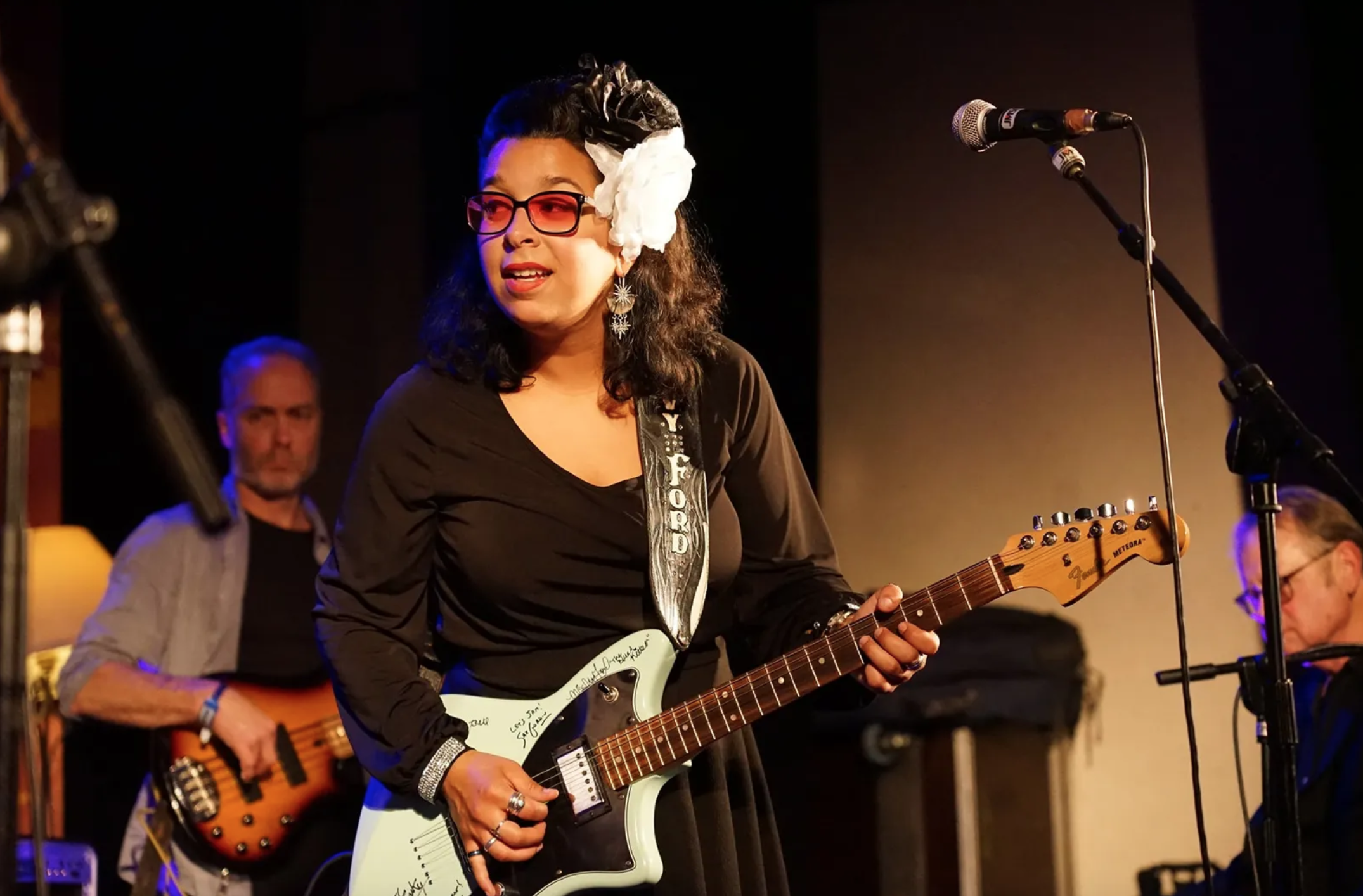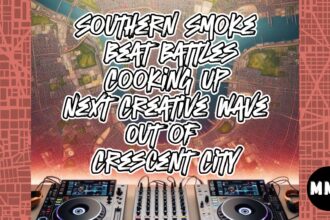Ivy Ford is an award-winning, globally recognized blues guitarist, songwriter, and producer from Chicago.
Nico Carter: How do you identify?
Ivy Ford: My daddy’s Black and my mom’s obviously Norwegian. Mixed, biracial, some old-school sayings is kind of like “the one drop rule,” if you’re black, you’re black. But I identify as being mixed race, being a woman of color, and definitely have myself as a female woman, female pronouns, things like that too.
You have this biracial identity, do you feel a lot of closeness to Norwegian culture as well as black culture?
Oh, absolutely. Especially when I was growing up as a kid, there were sometimes kids at school or whatever would be a little, I’m not going to say cruel, but ignorant as far as you can’t be both. You can’t be white and Black.
And I don’t know, I was just like, “yeah you can.” And that was never a thing, I never got caught up on that stuff. Now I know other people that are biracial and they do get a little hung up even as adults sometimes. But, I don’t know, I definitely identify with both sides of the cultural trend there and both are definitely very much a part of my life.
I definitely though have been in circumstances both as a kid, and adolescent, and even as an adult now where either I’ve been in mixed company where people don’t realize that about me and they can say some off-color, no pun intended, things. Yeah, it can be sucky sometimes but it don’t really get to me too much. Or it’s like, “okay, well that’s that” but I’m gonna keep doing me.
You are lighter-skinned, so people might identify you as ambiguous.
Yeah, in the winter time people think I’m like completely caucasian. And it’s hysterical because I used to bleach my hair like Etta James White, so especially then, that would really confuse some people. Now I’m back to my natural dark and curly hair, and in the summertime, I pick up a lot of color or melanin or whatever.
And then depending on who I’m with socially or whatever, I can be quite kind of like a chameleon. And it’s funny because I don’t really think about it until sometimes people will point that out. I’m just me.
Where does the blues come from?
It’s direct social commentary, especially when you go into historical blues music, even now, it’s direct social commentary—the words and the lyrics are literally telling stories. I mean sometimes songwriters in some songs can be a little more clever and witty and coy to get their point across, but it’s some songs young and old that it’s literally they’re just telling stories, and they’re true stories from life experience so that I think is super important and a factor that sticks out and a part of what makes blues music, blues music.
It’s a little more organic and raw by nature. It’s not always meant to be so pretty either, not that it can’t be pretty. It’s not always the goal.
How important are women to the history of the blues?
They’re extremely important. Especially if you do some research on blues and roots music and minstrels and vaudeville. In like, the mid-1900s to the 20s and 30s and even 40s, and I say this with a grain of salt because it doesn’t mean it did much for them in the big picture, but a lot of the “faces of the blues” meaning singers and front men and the publicity were women.
It was women singers like Bessie Smith, Ma Rainey; the first rockstars of the blues were women. I’m not sure why or how that dynamic changed to where it became mostly men in the business, but when it started out the main frontmen were actually women, and they were the ones that were calling the shots, and doing the business, and taking charge and things like that. And their bands were men, but they just came and showed up on the job.
Do you think there’s sexism in the blues?
Absolutely. Abso-effin-lutely.
Can you talk a little about that?
Well first of all, not only am I a bandleader, but I’m a lead guitar player in my band. And don’t get me wrong, there have been plenty of women guitar players and front-men musicians way before me and all that stuff. And there definitely will be many more after me that so far exceed my abilities, but I will say that being a female guitar player, especially when I was starting out—oooooh dudes don’t like that. They might not always say it right out front, but you know it’s like a pissing contest thing. so there’s definitely some unwritten animosity.
The subject turns to the preservation of blues traditions and Ivy says she wishes there were more Black people involved in the work of preserving the history which, “would probably bleed into having more black performers and things like that on the forefront of the blues industry.
…and why there ain’t one damn black-owned record label in the blues. And if there is—I mean maybe there is—but that’s like underground indie. The major ones are not. They’re all run and have been by white men.”
What’s that about?
Fuck if I know! Yeah, I don’t know what the fuck that’s about. In fact, I would say that starts out from racial segregation from back in the day. So in the 40s, 50s, 60s, and shit like that, even pre-Civil Rights, not that a whole lot of change happened right after Civil Rights, it was much easier for the white man to have a business and shit like that—and think that he was probably doing the black musician a favor by recording him and say, “I got big plans, I wanna show your talent,” and thus became the record companies and shit like that.
The white men had the pull and the authority to do so, but you know they’re making money off the artists. And this is like the history the community should know better. You could have an artist that was famous and shit like that in the blues and recording at a pristine studio and all this stuff, but they weren’t always seeing a lot of fruits of their labor, meaning financially. They didn’t always have the rights to their own music, so they could never own them themselves, which you know, takes away from your independence.
Even still like now sometimes, an artist will think, “Well, I’m just grateful to be playing,” and they don’t know any better to demand more.
So this stuff still impacts musicians today?
Hell fucking yeah it does!
And the reason there aren’t any big Black record labels has to do with structural racism that has perpetuated?
Yeah. I don’t think it’s as openly nasty in 2021. but it’s just as sheistery because it’s a business. I’m not gonna say it’s purely race-driven now because now it’s just money-driven, but that business model is very similar.
Can you talk about your music?
I have three full original albums. I got Time and Shine 2016, Harvesting My Roots (2017), and then I have my most recent, Collect 27, I released it in 2020. I produced, funded, mastered, and paid for them all myself.
Where did that money come from? Did you make it from blues performing?
Most of it, yeah. Wait, no, shit—all of it, yeah. It wasn’t easy, but it wasn’t as impossible as people think. You just gotta be dedicated and take the time.
And when people ask, “well do you do okay with it?” I say well lets put it this way, I’ve been able to write, record, produce, mix, and master three whole albums from the revenue they produced. When I did Time and Shine, I used a lot of my performance money to put in that. But my other two albums after that, a lot of that was reinvesting my recordings and my publishing and my royalties and things like that back into record those two other albums. And I wasn’t touching my gig money.
My music has been broadcast overseas in several different countries, it’s been up for a few different awards. I made it on the cover of Roots magazine, which is out of Belgium and they did a whole two or three page spread of me last year. So I still am getting a lot of exposure on my own without a label and at the end of the day. I can rest easy saying me and my musicians, we did that, and we own that and we don’t owe anyone anything else.
And some people might say, “Well don’t be too proud,” but you know what, I’m so tired of people being afraid of being proud of themselves or being afraid of doing well for themselves and things like that. I’ve gotten a lot of that over the years and I’m so tired of that. The title track off my album Time To Shine, the hook is, “Time to shine, don’t let no one do you dim,” which is don’t let anyone dim your light because they feel inadequate or whatever. It’s hard to love ourselves, it’s hard. So if you find that and it ain’t hurting nobody else, man…if there’s someone who wants to piss on that, you gotta tell them to fuck off.










